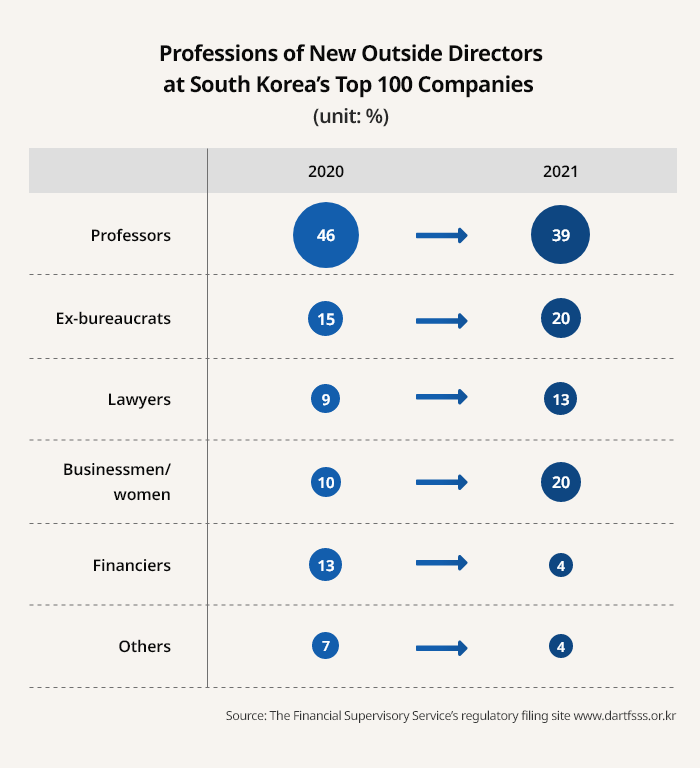Korean firms diversify boardrooms with experts, women
Mar 26, 2021 (Gmt+09:00)
CarlyleŌĆÖs Rubenstein sees commercial real estate undervalued


Infrastructure secondaries continue to rise amid inflation: Stafford


Goldman Sachs names Choi Seoul office chief


Golf equipment maker Taylormade to refinance $222 mn of debt


NPS' former key players move to law firms as its voting power increases



Leading South Korean companies are diversifying their once rubber-stamp boards with a broader pool of professionals and women, alongside the growing role of board members for responsible management.
Outside directors used to take a hands-off approach to their roles, simply giving a nod to every decision made by top management. Professors made up about half of the large Korean firms' boardrooms until last year.
But now that environmental, social and governance (ESG) has become the buzzword of business, ESG experts are increasingly filling board seats at domestic companies, including online platform giant Naver Corp and mobile messenger app Kakao Corp.┬Ā
Further, the upcoming diversity rules prodded them to hire more female directors. Under the new capital markets act, from next year Korean companies with total assets of 2 trillion won ($1.8 billion) or more should not fill their boardroom posts with just one gender.
At annual general meetings (AGMs) held this month, a total of 33 women were appointed as new outside directors at the country's 100 largest companies based on market capitalization. Among large business groups, 31 groups appointed female non-executive directors to vote at this year's AGM for the first time in their history, according to CEO Score, a Korean research company.
Still, women account for only 12% of the total of outside directors at the top 100 companies. But their proportion among new non-executive directors increased sharply, currently making up 31% of the newly appointed outside directors at the country's largest 100 companies, according to The Korea Economic Daily's analysis on Mar. 23. That compares to 18% a year earlier.┬Ā┬Ā
"The rapid paradigm shifts across industries triggered by the global pandemic put pressure on companies, leaving them wondering which new businesses they need to enter," said Yoo Jung-joo, corporate system head of the Federation of Korean Industries, a lobby group. "That's why a growing number of companies began to hire experts in their relevant fields as outside directors."
By profession, businesspeople, ex-bureaucrats and lawyers are taking more seats in the boardrooms. The proportion of businesspeople doubled to 20%, among the outside directors newly or re-appointed at this year's AGMs. In contrast, the portion of professors and financiers shrank.

LIMITED POOL, YOUNGER GENERATION
SK Holdings Co. said on Thursday that it would give outside directors more authority to get involved in the selection and dismissal of its chief executive and independent board members and to review investment proposals based on ESG standards.
As non-executive directors are required to take more responsibility, their candidate pool has shrunk. Some qualified professionals turned down offers for director positions because of increased duties.
As a result, 37 of the incumbent outside directors at the top 100 Korean companies are serving on more than two companies' boards.┬Ā
With a number of internet and game companies joining the ranks of the large-cap companies, the average age of outside directors at the top 100 has dropped.┬Ā The average age of the 185 non-executive directors, newly or re-appointed this year, fell to 57.6 from 60.1 a year earlier, although those in their sixties were the single biggest group by age with 47.5%.
By alma mater, Seoul National University topped the list with 37.4%.
By Jae-Won Park, Jae-Yeon Ko and Bum-Jin Chun┬Ā
wonderful@hankyung.com
Yeonhee Kim edited this article.
-
 Korean chipmakersSouth KoreaŌĆÖs chip design firms go abroad to tap $426 billion market
Korean chipmakersSouth KoreaŌĆÖs chip design firms go abroad to tap $426 billion market46 MINUTES AGO
-

-

-

-



